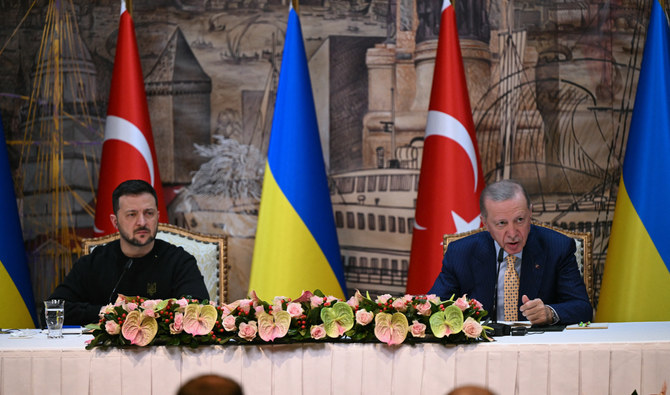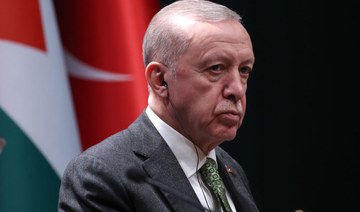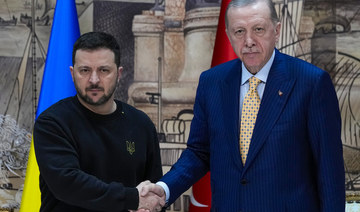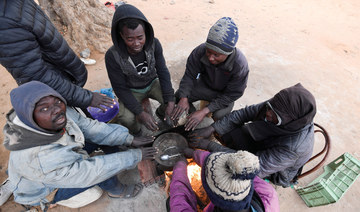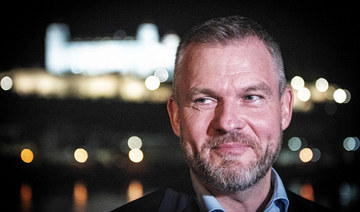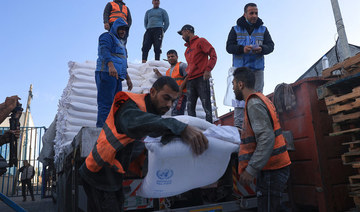ANKARA: Turkish relations with Russia are in the spotlight following Ukrainian President Volodymyr Zelensky’s visit to Istanbul on Friday.
Ukraine aims to bolster its defense capabilities using Turkish armament supplies. President Recep Tayyip Erdogan also offered to host a peace summit between Russia and Ukraine in a bid to end the war.
It took place shortly after Russian Foreign Minister Sergey Lavrov met his Turkish counterpart, Hakan Fidan, in Antalya, a southern province of Turkiye, during a diplomatic forum.
Russian President Vladimir Putin had been expected to visit Turkiye last month, but the trip was postponed and has yet to be rescheduled.
Zelensky’s visit involved a shipyard tour to oversee the construction of corvettes for the Ukrainian naval fleet. He also held discussions with Turkish defense company representatives.
Experts say that Turkiye is engaged in a delicate balancing act: Boosting defense trade with Ukraine while avoiding entry into the Western sanctions regime against Russia.
Emre Ersen, an expert on Russia-Turkiye relations from Marmara University in Istanbul, said: “So far, this policy has allowed Turkiye to develop its relations with Ukraine without antagonizing Russia.”
He added that Lavrov’s attendance at the Antalya Diplomacy Forum was “an important sign” that Moscow is giving priority to dialogue with Ankara.
At the same time, however, Turkish defense cooperation with Ukraine is growing, Ersen said. Zelensky described his visit to Istanbul as “sincere and fruitful.”
Meanwhile, US Secretary of State Antony Blinken and the Turkish foreign minister chaired the seventh meeting of the US-Turkiye Strategic Mechanism on March 7-8 in Washington.
In a joint statement released by the US State Department, the two sides “reiterated the support of the US and Turkiye for Ukraine’s sovereignty and territorial integrity against Russia’s unacceptable war.”
Galip Dalay, a senior consulting fellow at Chatham House, said that Turkiye and Ukraine, which both aim to counter Russian hegemony over the Black Sea, are “natural allies.”
He told Arab News: “Turkiye views Ukraine as a key element of its regional order strategy, serving as a counterbalance to Russia.
“Despite maintaining strong ties with Moscow, Ankara places strategic importance on its relationship with Kyiv.
“Collaboration between the two nations, especially in the realm of defense, has witnessed notable growth. Given their shared opposition to Russian hegemony in the Black Sea region, Turkiye and Ukraine are inherently aligned, positioning them as natural allies.”
He added: “Turkiye’s geopolitical balancing act when dealing with Russia means trying to be pro-Kyiv without being openly anti-Moscow.
“In recent periods, the Turkiye-Ukraine relationship has focused on the defense industry because of the fact that, in addition to the geopolitical compatibility between the two countries, there is a complementarity of their defense industries, with Ukraine having inherited Soviet know-how and military infrastructure,” Dalay said.
Turkiye’s balancing act, since the war began in early 2022, has shifted at various times, sometimes favoring the West and at other times tilting toward Moscow.
In the coming period, Dalay expects Turkiye to wage a diplomatic campaign for the removal of US sanctions and the relaunch of the country’s F-35 fighter program.
In 2019, Turkiye’s procurement of Russia’s S-400 air defense system led to its suspension from the F-35 program, as well as US sanctions under the Countering America’s Adversaries Through Sanctions Act a year later.
Ankara earned a bargaining chip in demanding concessions from Washington after approving Sweden’s NATO accession bid in January.
Although the US State Department approved a $23 billion deal to sell 40 F-16 fighter jets to Ankara, the delivery has not taken place.
The expected diplomatic campaign to relaunch Ankara’s F-35 program “will be conducted beyond rhetorical moves and will be part of Turkiye’s diplomatic agenda with the West,” Dalay said.
“These demands will also coincide with improving the climate in Turkiye-West ties. Both sides will explore possibilities of cooperation in the post-Soviet space, the South Caucasus and Central Asia, which Russia sees as its zones of influence, if not domination,” he added.
Despite Turkish overtures to the West, experts say that Ankara — which is reliant on Russian trade, energy and tourism — will maintain ties with Moscow.
“However, I expect that the content of Turkiye’s geopolitical balancing act with Russia will change in the coming period, with less emphasis on defense industry cooperation. While maintaining its functional relations with Moscow, Ankara will try to reduce the possibility of this relationship being a thorn in its ties with the West,” said Dalay.
Yevgeniya Gaber, a foreign policy expert and non-resident senior fellow at the Atlantic Council in Turkiye, said that “deterring Russia is in the best interests” of both Turkiye and Ukraine.
She added: “The nature of this relation has been always different but the fact that Russia threatens the rule of law and territorial integrity in this part of the world, as well as the war in Ukraine and Russian presence in Moldova and Georgia, poses threats to Turkiye.
“Therefore, Ukraine is a natural deterrent against Russia without expanding the naval presence of NATO countries in the region.”
Demonstrations of Turkish weapon systems in Ukraine could also bode well for Ankara’s defense exports to third markets, Gaber said.
“It also has the very big potential for the future to export these joint products.
“I don’t think that there will be any reaction from Russian side to these agreements because Turkiye and Ukraine have been in this business since almost a decade and it has been developing each year,” she added.
Turkiye — which is developing its own fifth-generation fighter jet and new drone models — has also shown interest in using Ukrainian engine technology in its own aviation systems.
“The same goes for the new generation of Bayraktar drones, like Akinci and Kizil Elma,” she said.
“For Ukraine, having Turkiye on board as a strategic partner on defense cooperation is also important against the war of aggression of Russia.
“Turkiye has seen how ineffective Russian defense systems are, including S-400s, which showed the limits of Russian defense technology.
“When it comes to strategic cooperation in defense, Turkiye is much more interested in cooperating with Ukraine and Western allies,” she added.
In February, Turkish defense company Baykar began construction on a plant in Ukraine, where it will manufacture indigenous drone models.
Baykar CEO Haluk Bayraktar announced during the World Defense Show in Riyadh last month that the plant will employ about 500 people after a year-long construction period.



